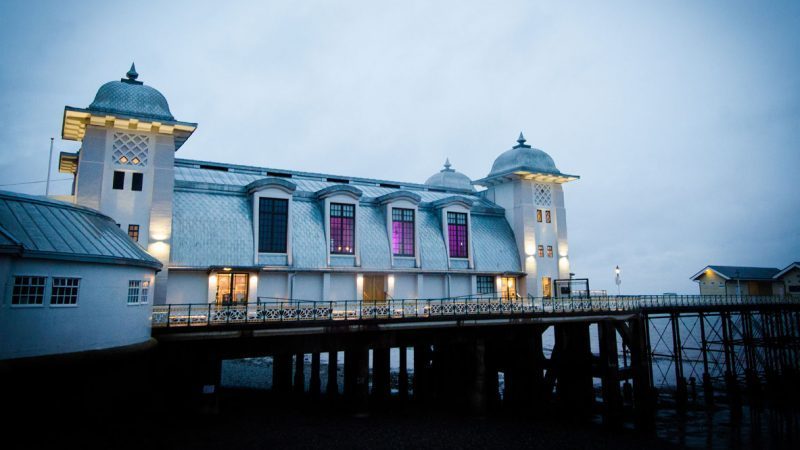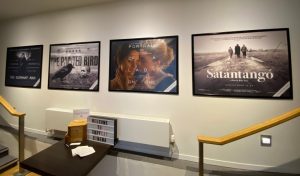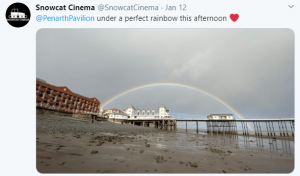
Snowcat Cinema: A Placement on the Pier by Chloe
South Wales’ Penarth Pier offers home not only to a cone of chips and a seaside view, but also to the world  of Snowcat Cinema, where I’ve spent the past six weeks of my BA Film Studies exhibition-based placement.
of Snowcat Cinema, where I’ve spent the past six weeks of my BA Film Studies exhibition-based placement.
Snowcat, run by one-man-band Ben, is an independent cinema tucked away on the upper floor of the Pier Pavilion. Screenings run in the evenings from Thursday to Sunday, and include every kind of film: from the occasional blockbuster to, more often, the abstract and whimsical or the classic.
The nature of the cinema, independently developed and run, has allowed me a close insight into each of the behind-the-scenes processes of exhibition: the planning, programming and scheduling which all takes place before the screening of any film. I was one of four students spending time at Snowcat, and the varied interests of each member of our group made for a holistic exploration of the different elements which go into running a cinema.
In one of our first experiences, we were shown the ropes of preparing a ‘playlist’ for a screening. First, transferring the film from its DCP (Digital Cinema Package) into a playable format, and then scheduling the adverts, logos, and ‘no phone’ signals which will precede it. These technical skills in particular were something I had never considered when thinking about exhibition: naturally, I had expected to spend some time in a projection room, but I had never considered the amount of work which takes place before the film is even shown.
Such skills are extensive, and require a developed knowledge of the softwares involved in order to work. The planning which goes into ensuring the correct aspect ratio, the order of adverts, and even the timing of gaps between images, is such an incredibly key part of the film-watching experience which many audience members remain unaware of.
The real beauty of working a placement in somewhere like Snowcat, however, is the diversity of tasks I’ve been able to get involved in and, as such, the range of skills which I’ve been able to develop.
Again (and this is so important to the cinema and to my experience), the cinema is independently run – picked up and put together by Ben alone – and therefore doesn’t have the luxury of a team that can collaborate to put together screenings. All work is done by Ben, which means full involvement in every step of the process when arranging events.

Of course, though, the group nature of this placement – expanding Ben’s team from one to five – meant that a level of communication was necessary to get things done. With every step of putting together a screening came emails with Ben, messages among us students, and updates via the shared DropBox file on which we came to rely for sharing data. The process was inherently collaborative, forcing me to refine and adapt my communicative skills to a group setting that I’d had little experience with previously.
The later weeks of this placement involved looking further into the marketing, ticket-selling, and public engagement aspects of working within the cinema. First, a run-down on the cinema’s audiences – those that Ben is targeting with his choices of film – and the ways in which he engages with them to encourage their attendance at screenings. Whilst the cinema’s primary audience is the older population of Penarth, usually retirees who come week-on-week to reminisce on films seen in their earlier years, the cinema is currently in the process of expanding and diversifying its audience to include the younger communities of Cardiff.
A large part of Snowcat’s engagement, therefore, takes place via social media: events are created on Facebook, and Twitter is used to announce upcoming films and interact with other local film communities, cinephiles and organisations such as Cardiff’s Chapter Arts. Here, the cinema has the opportunity not only to engage with existing filmgoers, but to reach those who are likely unaware that Snowcat even exists.
Distinct to the world of independent cinema, though, is the personal touch which comes with this online engagement. Besides a focus on upcoming films and events, Ben often tweets images relating to life in Penarth – a rainbow over the pier or his own dogs on a walk – to engage with the local audiences attending the cinema as a way of supporting their community.
Clearly, the concept of community is central to the running of Snowcat: with an audience consisting largely of returning viewers, it’s no secret that the Penarth locals are at the heart of everything the cinema does.
The screen itself has a screening suggestion box outside, and many audience members stay behind after each showing to take part in discussion around the films they’ve just watched.
When it does come to promoting films, though, Snowcat collects a list of specific information and images which can be used to market individual screenings. First, the film’s basic details – the director, release date, running time, colour, language and rating – and then a brief description of the film’s narrative with details of its popular actors or any awards it may have won.

Images of various shapes (a ‘quad’, ‘portrait’, and ‘banner’ photo) are also collected to be used in various locations, from social media promotions to the TicketSource pages where seats will be sold. Here, we were given the opportunity to work independently in gathering the promotional materials for specific films. With some help from Ben, I collected materials for the Jojo Rabbit (2019) screening and then, alone, for the epic seven-hour Sátántangó (1994) showing.
The next step, and the one which took place in my final session at Snowcat, was a scheduling task. Independently, we were tasked with searching for events and anniversaries taking place across the remainder of the year from which a weekend of relevant screenings could be put together.
This is, so far, possibly the task I’ve found most intriguing: it’s rare that I, as an audience member, ever see or have the opportunity to understand the processes by which cinemas select and plan the films that they’re going to show. Snowcat’s independent management, furthermore, makes for a high degree of freedom over the screenings that can take place: so long as Ben can get permission, the film can be shown.
Pride Cymru, taking place from the 28th-30th August, provides opportunities for a weekend of LGBTQ+ themed cinema. On December 3rd, Jean-Luc Godard will celebrate his 90th birthday. Hitchcock’s Psycho turns 60 years old in September, and Jaws will be 45 in June.
It quickly becomes clear how central research skills are to the exhibition industry, particularly in the case of independently-run organisations. And, beyond that, the need for critical thinking skills when picking what can be shown to a cinema’s specific audience. Do Penarth’s pensioner’s want to watch Get Out for black history month? Possibly not. But The Color Purple, or 12 Years a Slave? Much more likely.
This part of the placement – the chance to develop skills around researching and putting together events appropriate for a particular audience – is one I feel I particularly engaged with. The opportunity to start from scratch, researching and developing potential ideas and events, is an experience I hadn’t expected to have on my placement but one which I definitely found exciting.
In putting together anniversary or celebration-based weekends of screenings, it becomes possible to create a wholly unique film experience, far different to the realm of multiplex chain cinemas.
Whilst Snowcat has now, unfortunately, had to close in the wake of the UK lockdown, we had initially made plans to work on a ‘pop-up’ cinema in the Summer. Working out the logistics of an inflatable screen at the end of the pier and what would overall be a less conventional cinema experience is something which I had particularly been looking forward to, and which I hope will still take place in the future.
For the same reasons, the cinema also had to cancel its Portrait of a Lady on Fire (2019) on the 28th March – a screening that I had been planning to come along to in order to engage more directly with the cinema’s community and with a more front-of-house role and the customer service skills involved in this.
So far, though, Snowcat has provided me with the chance to explore almost every step in the independent exhibition process, from brainstorming an outline of vague ideas for the year’s screenings to marketing an event and creating the film playlist which audiences will eventually see. Going forward, I’m eager to get back in contact with Snowcat and Ben when possible to help reach new audiences and further broaden my understanding of the exhibition process.